
7-Days : The Ultimate Tanzania Safari
7 days
Instant confirmation
About this activity
DAY 1: ARRIVAL IN TANZANIA
Arrive at the Kilimanjaro International Airport where you will picked up and transfer to Hotel in Arusha town. At the evening you will meet your guide who will brief you on your upcoming safari.
DAY 2: ARUSHA CITY- LAKE MANYARA
After breakfast you will be driven through the Lake Manyara. From there you will be driven through west to the Great Rift Valley and the Lake Manyara National Park.
The park’s varied attracts a wide variety of animals. In the evening you will transferred to your Hotel/Lodge.
DAY 3: LAKE MANYARA - SERENGETI NATIONAL PARK
After breakfast you will be picked up from hotel and driven through towards the Serengeti National Park, via the beautiful high lying farmland of Karatu and the Ngorongoro Conservation Area.
We head to the central park area, known as the Seronera area, one of the richest wildlife habitats in the park, featuring the Seronera River, which provides a valuable water source to this area and therefore attracts wildlife well representative of most of the Serengeti’s species. We arrive in time for lunch and enjoy an afternoon game drive. In the evening you will be transferred to the Hotel/Lodge for overnight
DAY 4: SERENGETI PLAIN
Hot Air Balloon over the Serengeti Plains (available at additional cost by pre-arrangement).
After breakfast game viewing drive along the Sogore River Circuit and which is good for possible lion, Thomson gazelle, topi, ostrich and cheetah sightings.
DAY 5: SERENGETI NATIONAL PARK - NGORONGORO CRATER
This morning your driver-guide will help you spot some more of the many species at Serengeti, teaching you about their fascinating habits and habitats. After a pleasant picnic lunch, it's time to drive eastwards to visit another spectacular setting for Tanzania's wildlife, the famous Ngorongoro Crater. On arrival, settle in at the Hotel/Lodge. Tomorrow, the wonders of the crater await us.
Day 6: NGORONGORO CRATER - ARUSHA CITY
The Ngorongoro Crater is one of the most densely crowded African wildlife areas in the world and is home to an estimated 30,000 animals including some of Tanzania’s last remaining black rhino. Supported by a year round water supply and fodder,
Different animal species;-
• Include herds of wildebeest, zebra, buffalo, eland, warthog, hippo,giant African elephants, lions, hyenas, jackals, cheetahs and the ever-elusive leopard
DAY 7: DEPART IN TANZANIA
This day left for your next destination. A vehicle will take you back to airport. In case you have evening flight we can extend your time in hotel at extra charge
Read more
Show less
Arrive at the Kilimanjaro International Airport where you will picked up and transfer to Hotel in Arusha town. At the evening you will meet your guide who will brief you on your upcoming safari.
DAY 2: ARUSHA CITY- LAKE MANYARA
After breakfast you will be driven through the Lake Manyara. From there you will be driven through west to the Great Rift Valley and the Lake Manyara National Park.
The park’s varied attracts a wide variety of animals. In the evening you will transferred to your Hotel/Lodge.
DAY 3: LAKE MANYARA - SERENGETI NATIONAL PARK
After breakfast you will be picked up from hotel and driven through towards the Serengeti National Park, via the beautiful high lying farmland of Karatu and the Ngorongoro Conservation Area.
We head to the central park area, known as the Seronera area, one of the richest wildlife habitats in the park, featuring the Seronera River, which provides a valuable water source to this area and therefore attracts wildlife well representative of most of the Serengeti’s species. We arrive in time for lunch and enjoy an afternoon game drive. In the evening you will be transferred to the Hotel/Lodge for overnight
DAY 4: SERENGETI PLAIN
Hot Air Balloon over the Serengeti Plains (available at additional cost by pre-arrangement).
After breakfast game viewing drive along the Sogore River Circuit and which is good for possible lion, Thomson gazelle, topi, ostrich and cheetah sightings.
DAY 5: SERENGETI NATIONAL PARK - NGORONGORO CRATER
This morning your driver-guide will help you spot some more of the many species at Serengeti, teaching you about their fascinating habits and habitats. After a pleasant picnic lunch, it's time to drive eastwards to visit another spectacular setting for Tanzania's wildlife, the famous Ngorongoro Crater. On arrival, settle in at the Hotel/Lodge. Tomorrow, the wonders of the crater await us.
Day 6: NGORONGORO CRATER - ARUSHA CITY
The Ngorongoro Crater is one of the most densely crowded African wildlife areas in the world and is home to an estimated 30,000 animals including some of Tanzania’s last remaining black rhino. Supported by a year round water supply and fodder,
Different animal species;-
• Include herds of wildebeest, zebra, buffalo, eland, warthog, hippo,giant African elephants, lions, hyenas, jackals, cheetahs and the ever-elusive leopard
DAY 7: DEPART IN TANZANIA
This day left for your next destination. A vehicle will take you back to airport. In case you have evening flight we can extend your time in hotel at extra charge
Included
- Two night in Moshi/Arusha, 4nights on safari
- 4x4 safari Vehicle modified Land cruiser with viewing roof
- Pick up at Kilimanjaro International Airport
- Breakfast
- Lunch
- Dinner
- Lake Manyara
- Serengeti National Park
- Ngorongoro Crater
- Game drive in Lake Manyara National Park
- Game drive in Serengeti National Park
- Game drive in Ngorongoro Crater
- All Weather Adventures safari driver guide
- Bottled water
Not included
- Tipping to your driver guide
- Lunches, dinners and drinks at your hotel in Moshi/Arusha before and after safari.
- Driver guide: $20/day
- International Flights and Insurance Visa
- 100 per person for US Nationals and $50 per person for other Country Nationals
- All type of soft and hard drinks
- Laundry
- Toiletries
Additional
- Confirmation will be received at time of booking
- Not wheelchair accessible
- During your trip off road, the dust enters inside the car through the open windows / roof, so don't choose blindingly white clothes, Casual, comfortable and easy to wash clothes are recommended. The goal is to pack lightly as most lodges and camps will launder clothes for a small fee. Safaris are informal and there is no need to dress up. Do plan to dress in layers so you can adjust to temperature changes as early morning game drives can be quite cold depending on the time of year while day time temperatures can get quite warm. Stick to neutral or khaki colours and avoid wearing dark blue or black clothes as these colours tend to attract tsetse flies. Wide brimmed hats, sun glasses, sunscreen, insect repellent are a necessity. After sunset, we recommend that you wear long pants, long sleeved shirts and socks and spray insect repellent to avoid being bitten by mosquitoes.
- Ngorongoro most hotels are at an altitude of 3000 m, where at the night time the temperature falls to zero, so warm clothes will be useful.
- Serengeti, on the contrary, it can be hot in sneakers, however the journey in sandals would be more comfortable.
- Hotel has luggage storage Facilities. Therefore, for more safe you can leave your luggage in the hotel
- All tourist hotels adapt their menus to suit European tastes, while also including some local dishes. You should have no problems when it comes to food so long as you make your dietary preferences (vegetarian, allergic, etc.) clear to your Tour Manager when booking.
- Staff your mini first aid kit:
- Analgesic and antipyretic;
- Drugs from stomach problems (e.g., Enterofuryl, No-Spa, Imodium, Festal, activated carbon);
- Antiseptic (iodine, cream relieves itching and irritation after insect bites);
- Bactericidal plaster, bandage;
- Antimalarial drugs (such as Malarone, Lariam);
- Tablets from motion sickness while the bad work of vestibular apparatus (Dramina, Dramineks);
- Antihistamines for allergies (Claritin, Loratadine, Azelastine).
- It is also recommended to bring the repellents because mosquitoes are usually active early in the morning and at sunset, midges terrorize everybody near the water bodies and the botflies feast in the near vicinity of the animals.
- Do not forget the sunscreen! Choose a product with SPF 40 protection or higher that the equatorial sun will not paint your skin in all the shades of an African sunset.
- We provide full meals from breakfast, lunch and dinner. Early in the morning you will take breakfast at lodge or camp site, during lunch time you get nice food in lunch box and dinner time taken at lodge.
- The best time to go on safari is really dependent on when you wish to come, your interests, places you wish to visit and activities that you may want to do.
- In any time you decide to travel, we will build your itinerary to ensure you’re located in the right parks and the right regions for best wildlife viewing. We can make suggestions about the best areas to visit and build the safari around the time of you wish to travel, interests and budget.
- The best time to see wildebeest migration spread out across the Serengeti plains, we’ll recommend you travel in the green season stretching from December to April. This is especially good for the calving season. As the migration moves North from June onwards the Northern part of the Serengeti and river crossings into Kenya’s Maasai Mara is the best area.
- Pick up at Kilimanjaro International Airport
- All accommodation before and after safari(breakfast and rooms)
- Private professional safari guide
- Private 4 x 4 safari with roof for game viewing
- Entrance park fees and 18% VAT to our entrance fees
- Entrance fees to all national parks
- Maasai life style tour if your interest
- All meals included(breakfast, lunch and dinner)
- Tips to your safari guide
- Air tickets
- Tanzania Visa fee
- Travel Insurance
- Alcohol at hotels, unless specifically stated under all-inclusive rates
- Optional activities such as Balloon safaris
- Walking safaris, Maasai village tours, Oldvai Gorge but these can be included if you wish
- Taking an African safari with your children can be a very rewarding experience, creating some unforgettable family memories. It will also instill respect in your children at an early age for our beautiful planet and the wildlife that inhabit it, which is a very important factor for conservation efforts.
- Get ready for rough road conditions during game drives and transfers within the national parks and conservation areas. The main roads to and from Arusha to Tarangire National Park, Lake Manyara National Park and to the Ngorongoro Conservation Area Gate are completely paved but the roads within the national parks and conservation areas are not. Remember, traversing rough roads and tracks are a part of the excitement of the African game driving experience.
- For best sightings, we recommend that you leave the lodge or camp at 6:00am sharp for early morning game drives. Many animals are most active in the early morning hours between 6:00am to 9:00am. Your safari guide will arrange breakfast boxes with the lodges so that you can make the most of the early morning hours when game will be most active and lighting is best for photography
- Best way is to follow the instruction of your safari guide. Many of the wildlife may seem harmless and almost tame, especially those that have been habituated to safari vehicles in the Serengeti and Ngorongoro Crater but they are wild animals and potentially extremely dangerous.
- Most of the safari lodges and camps are not fenced and wildlife move freely about. Please follow all safety instructions provided by the lodge or camp regarding moving to and from your room/tent after dark. If you have young children, do not let them out of your sight or wander alone under any circumstances.
- You are responsible for your own safety, if you are unsure of anything, please do not hesitate to ask your safari guide or lodge/camp staff.
- Be prepared for dusty conditions. Even in the rainy/green season, the plains can dry up quickly and the fine soil and the wind can cause dust problems. In the dry season, the conditions will be worse. Cameras, video and other electronic equipment need to be protected from the dust and we recommend bringing a camera bag that can be easily opened and completely sealed to protect against dust when the camera or video equipment are not being used.
- We can include a variety of activities which will allows you to meet with local people to appreciate their culture and tradition. From a Maasai village tour to a visit to a local primary school and orphanage or shopping at a local market, these activities can easily be incorporated into your itinerary
- If you are coming from North America or Europe, we recommend flying KLM to Kilimanjaro International Airport (JRO) Air France, British Airways, Kenya Airways via Nairobi, Turkish airlines via Turkey or Qatar airlines via the Middle East.
- If you are coming from China, we recommend flying Ethiopian Air to Kilimanjaro International Airport (JRO)
- If you are planning a visit to Zanzibar after your safari, we recommend that you either (i) arrange your flight so that you arrive at JRO and depart through Dar Es Salaam International Airport (DAR) or consider arriving into Tanzania through DAR and then take a connecting flight to JRO to start your safari.
- Zanzibar flights are available from Kilimanjaro Airport and Arusha airport and also from various locations in the Serengeti.
- The flight between JRO and DAR is approximately about one hour.
- Please confirm all international flights and seating prior to departure.
- There are various options. We can book hotels for your arrival in Arusha or you can choose to book yourself. Arusha is where our safari begins and ends. We can include airport transfers from Kilimanjaro or Arusha airport or if you are coming from Kenya we can transfer you from the borders. You can also arrange your own transfers and we can pick you up for the safaris from your hotel in Arusha , Moshi or straight from either of the airports.
- Bringing children on safari is not only safe, but also highly educational and lots of fun for them. Seeing wild animals in their natural habitat, as opposed to a Zoo, is an experience that they shall carry with them through the rest of their lives. Just keep in mind that spending hours in a safari vehicle may be hard on children younger than 2.
- Citizens of the EU and USA can acquire entry visas at international airports in Tanzania as well as other border crossings. Visa costs: generally USD 50 (USD 100 for The citizens of USA)
- If your comfort during what could be a rather lengthy flight with either tight connections or long layovers outweighs cost considerations, then we recommend that you consult the ratings in the World’s Top 100 Airlines 2017.
- Otherwise, pick what seems to be the most convenient of the airlines in your price range. Turkish, Emirates, Fly Dubai, KLM, Ethiopian are among the airlines with regular flights to Tanzania.
- One of our drivers will meet you with a sign bearing your/your group’s name at your airport of arrival regardless of the time of day.
- In short- Tanzania is absolutely safe for tourists. Tourism provides a large part of the country’s foreign income and the local authorities take matters of security very seriously. Moreover, Tanzania is one of the most politically stable countries in the region and Tanzanians are very friendly as a people.
- This said, some criminality does exist, just as it does everywhere else. We, therefore, recommend that you exercise common sense and follow the rules below:
- Avoid the dangerous parts of any town- these are usually mentioned in most books and your guide will be happy to point them out.
- Do not leave your belongings unattended.
- When planning to take photos in towns, it is best to bring along a guide. This is not so much in the interests of safety, but, rather, in order to facilitate communication with the locals, who are – for cultural reasons – not always happy about being photographed and often do not speak English.
- After dark it is best to avoid walking and use taxis for all your travel within town. These are best organized by your tour operator or hotel reception.
- There have been no recorded cases of yellow fever in the country’s tourist regions (most of the country, really) in the last twenty years. However, when planning to visit the less visited parts, it may be recommended that you get yellow fever vaccination two weeks before your planned travel date. This vaccination is the effective for ten years. You may read more about
- in our article.
- The problem of malaria in Tanzania is greatly exaggerated. Not all species of mosquito carry malaria to begin with, and contracting malaria is unlikely in most parts of the country. However, if planning on visiting the less visited parts of the country, we would recommend that you read article about
- .
- We highly recommend that you have your travel insurance regardless of what foreign country you may be visiting. If you are planning a Kilimanjaro climb, make sure that climbing emergencies are covered in your policy at height no less than 6,000 meters. If necessary your Tour Manager will assist with purchasing such insurance.
- Yes, all the Hotels our company offers provide safe water. Taking showers and brushing you teeth is never a problem and the water is actually potable. However, we still recommend that you only drink bottled water, which is always available at hotels and shops
- Tanzania has two major seasons. Although weather patterns can vary widely from year to year typically the dry season starts around June and last through until October and the green or rainy season commences from November until around May with a short dry season typically between January and February.
- The parks located in the popular northern safari circuit are located at a high elevation making the climate pleasant for game viewing even during midday. The average temperature in the Serengeti during the warmer months of October to March can range from a high of 29C to a low of 17C, and during the cooler months of April to September a high of 26C to a low of 13C. The rim of the Ngorongoro Crater has an elevation of over 2,200 meters and the night time temperatures can drop below freezing. It is always advisable to bring warmer jumpers or a light jacket for evenings and early mornings.
- This is a private tour/activity. Only your group will participate
Features
Tourism
60%
Cultural
35%
Aquatic
30%
Adrenaline
30%
You may also like









 See all 18 Collections
See all 18 Collections
Click to discover other experiences
See all
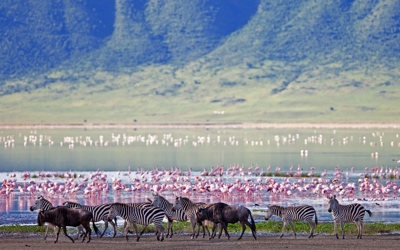
Collections
Ngorongoro Crater
196 Activities
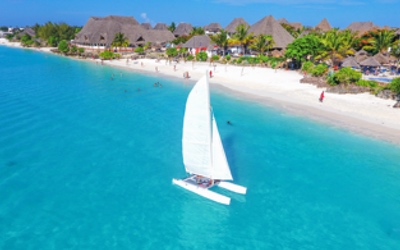
Collections
Beach holidays
10 Activities
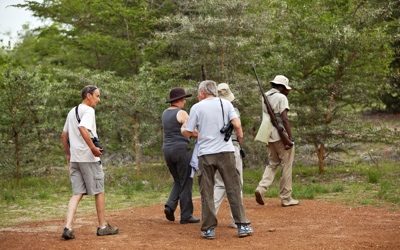
Collections
Walking tour
12 Activities
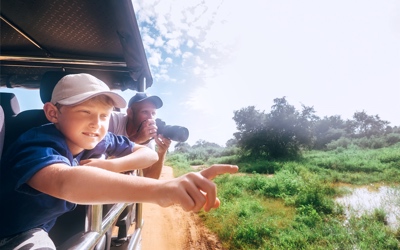
Collections
Family tours
9 Activities
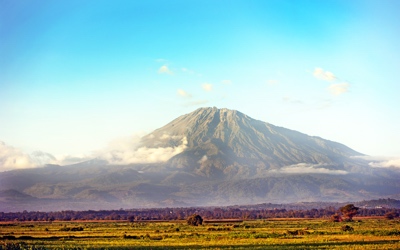
Collections
Luxury Tanzania
27 Activities
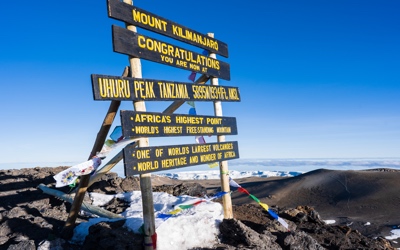
Collections
Trekking & hiking
76 Activities
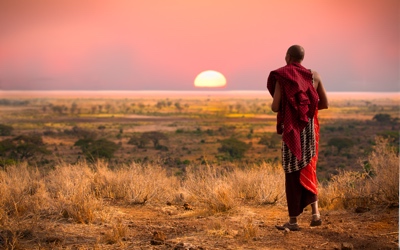
Collections
Cultural activities
24 Activities
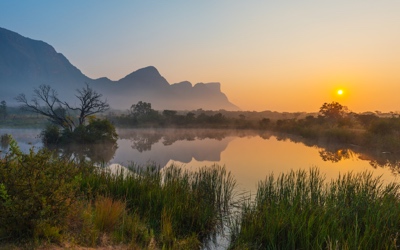
Collections
Original
13 Activities
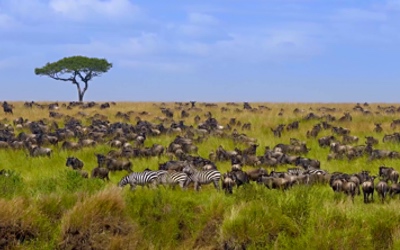
Collections
Migration Safari
58 Activities
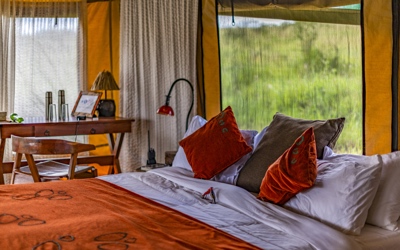
Collections
Lodge Adventure Tanzania
52 Activities

